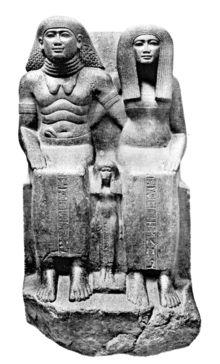Sennefer
The Ancient Egyptian noble Sennefer was "Mayor of the City" (i.e. Thebes) and "Overseer of the Granaries and Fields, Gardens and Cattle of Amun" during the reign of Amenhotep II of the Eighteenth Dynasty of Egypt. Being a favourite of the king he accumulated great wealth. He was also allowed to place a double statue[1] of himself and his wife in the temple at Karnak.[2] The famous garden plan, often described is Sennefer's Garden, is more likely to be of a garden which Sennefer managed, and perhaps designed, than to be of a garden which Sennefer owned.[3]
_II_on_right_arm._From_the_temple_of_Seth_at_Naqqada%2C_Egypt._The_Petrie_Museum_of_Egyptian_Archaeology%2C_London.jpg)
| Sennefer Mayor of Thebes | |
|---|---|
 Double statue of Sennefer and his wife Sentnay, from Karnak (Cairo CG 42126). | |
| Successor | Kenamun |
| Dynasty | 18th Dynasty |
| Pharaoh | Amenhotep II |
| Father | Nu |
| Mother | Henutiry |
| Wife | Sentnay |
| Children | Mutnefert, Muttuy and other daughters |
| Burial | TT96 in Thebes, or maybe KV42 |
He was the son of the second priest Hor-wer in Qus, Nu; his mother was a woman called Henutiry, Tiiry. Sennefer is called son of the sister of Ahmose Humay, a male royal nurse, brother to Amenhotep II's vizier Amenemopet[4] , and married to the royal nurse Sentnay.[5] His elder daughter Muttuy apparently married Kenamun, who succeeded Sennefer as mayor of Thebes.[6] His brother Amenemipet called Pairy was buried close by in TT29.[7]
He was buried in a small but well decorated tomb (TT96, sometimes known as the "Tomb of the Vineyards" due to its decoration[8]), located in the Sheikh Abd el-Qurna district of the Theban Necropolis opposite Luxor in Egypt.
However, some funerary items for Sennefer and his family have been found in KV42, the tomb of Merytre-Hatshepsut, so he may have re-used this tomb for his actual burial. Some containers of Sennefer and Sentnay were also discovered in KV32, the tomb of Queen Tiaa, wife of Amenhotep II and mother of Thutmose IV.[9]
References
- Cairo CG 42126.
- Rice, Michael (1999). Who's Who in Ancient Egypt. Routledge. p. 183.
- "M_L Gothein History of Garden Art".
- JJ Shirley: Crisis, Restructuring of the State: From the Second Intermediate Period to the Advent of the Ramesses, in: Juan Carlos Moreno Garcia: Ancient Egyptian Administration, Leiden, Boston 2013, ISBN 978-90-04-24952-3, p. 587.
- David B. O'Connor, Eric H. Cline, Amenhotep III: Perspectives on His Reign, University of Michigan Press 1998, ISBN 0-472-08833-5, pp.38f.
- Ian Shaw, The Oxford History of Ancient Egypt, Oxford University Press 2003, ISBN 0-19-280458-8, p.263
- Rice, Michael (1999). Who's Who in Ancient Egypt. Routledge. p. 12.
- Baikie, James (1932). Egyptian Antiquities in the Nile Valley. Methuen. pp. 612–614.
- "KV 42 (Hatshepsut-Meryet-Ra)". Retrieved 2007-06-20.
| Wikimedia Commons has media related to Sennefer. |
External links
- (in French) Page about TT96 on Osirisnet.net